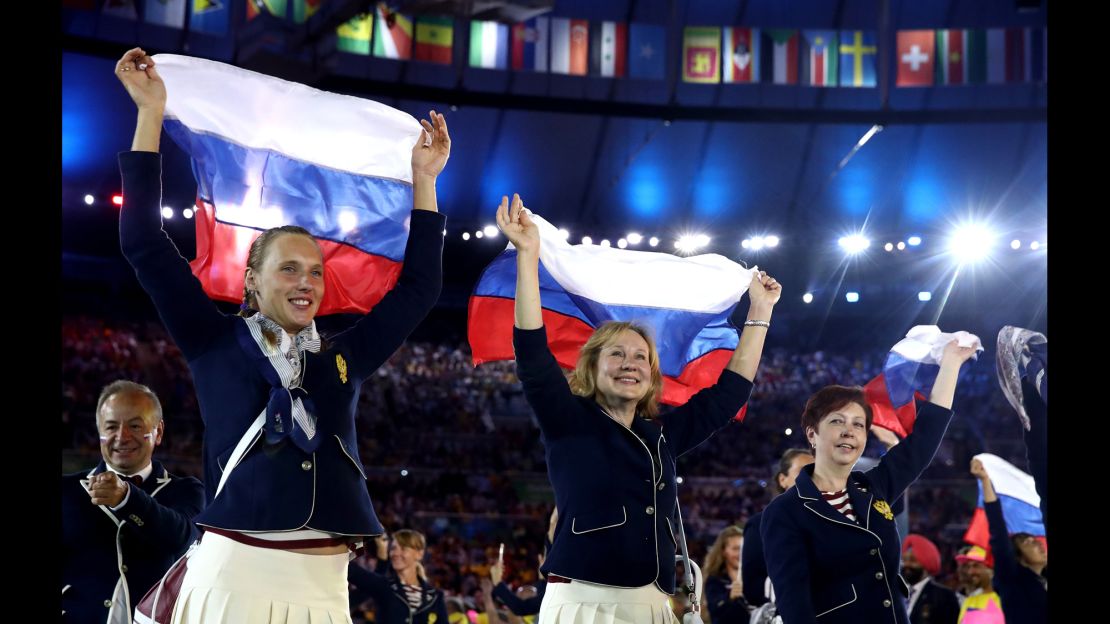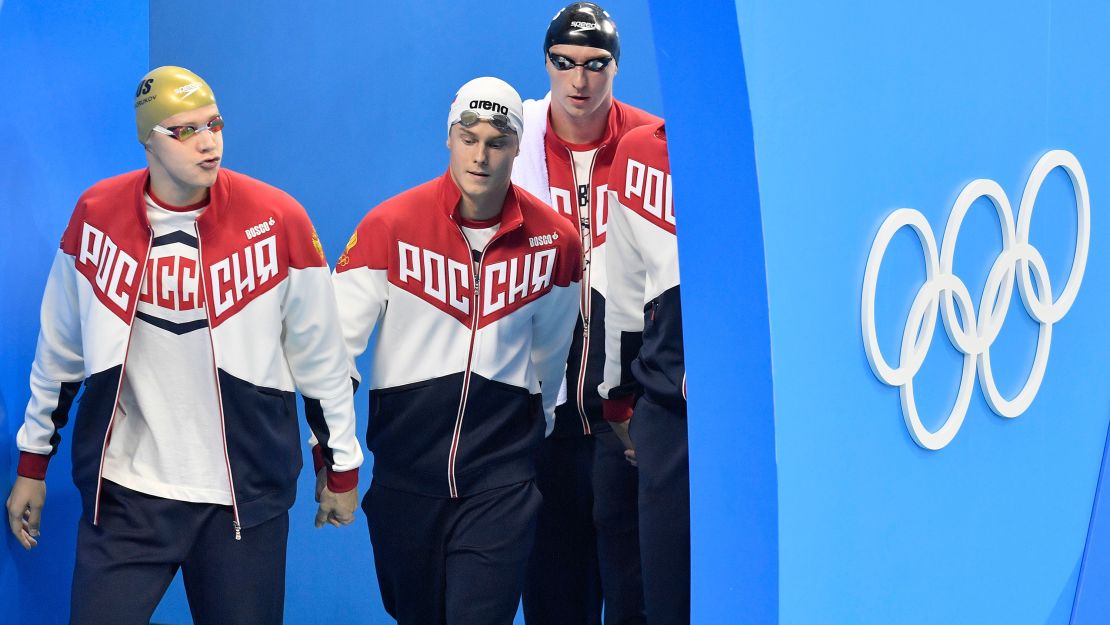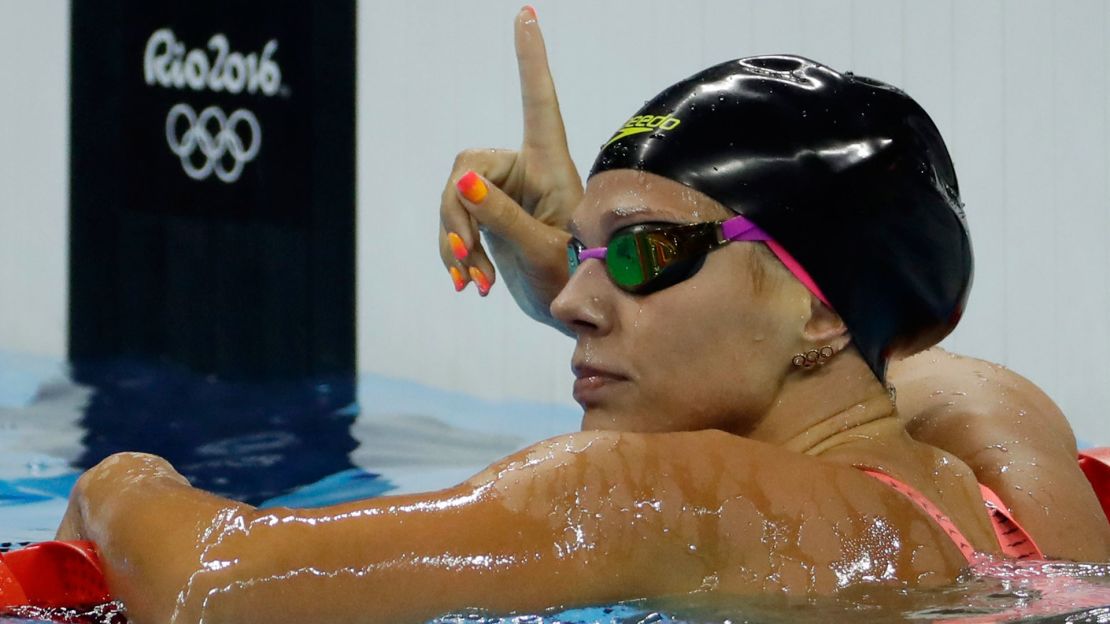Story highlights
U.S.'s Lilly King, Russia's Yuliya Efimova to face off Monday after exchange of fingers
Olympics fans have been casting boos at Russian athletes after doping allegations, bans
Roughly 70% of Russia’s Olympics contingent has been cleared to take part in the Rio Games, but that doesn’t mean competitors or spectators have to like it.
Fans sounded off during Friday’s Opening Ceremony, turning the normally jubilant parade of nations into mixed commentary on the decision to let 271 of Russia’s 389 athletes compete despite a report accusing the country of “state-sponsored doping.”
International Olympic Committee spokesman Mark Adams said Monday it was a shame the Court of Arbitration for Sport wasn’t “tougher on doping,” but that Olympics officials have no choice but to accept the decision.
“These are people who have served sanctions and are now clear …” he said. “There are athletes from many teams who have served sanctions and are able to compete.”
American Lilly King was one of many swimmers – including Lithuania’s Ruta Meilutyte and Zimbabwe’s Kirsty Coventry – who was not happy with the court’s decision allowing Russian athletes to compete.
Resurrecting a Cold War rivalry that reached its zenith years before she was born, King called out her Russian rival, Yuliya Efimova, who faced two bans for performance-enhancing drugs before eventually being allowed to swim in Rio.
That sets up a tasty finals in the women’s 100-meter breaststroke Monday night, but more on that in a second.
Let’s take a look at how Russia has been welcomed – or, perhaps not so much – at the Rio Games.
Opening Night

Forgive the baseball metaphor – the sport hasn’t been played in the Olympics since 2008 – but garnering applause during the Games’ Opening Ceremony should be a home run.
Not so for the Russians. As the athletes stepped into Maracanã Stadium, rocking bowties and blazers with white piping, they were met with a smattering of boos among the applause.
If few or none of them noticed the boobirds, it’d be understandable considering that until two weeks ago, there were still mutterings about banning the entire team from competition.
The Russians marched into the stadium smiling and waving. Some wore Russian flags around their necks like capes, while others blew kisses to the cameras. Many recorded the moment on their mobile phones. Most didn’t seem fazed by the mixed reaction to their appearance. See for yourself here (the Russians make their entrance around 3:42:30).
Rio 2016 spokeswoman Mario Andrada chalked the jeers up to the passion of Brazil’s sports fans and the country’s soccer/football culture – though, to be fair, it did not appear Brazilians were the lone culprits in deriding the Russians.
“We are helping Brazilians to understand the right moment and the right level of passion. But we’d rather have some passion than none and I think it’s a process of learning,” he said. “Booing is kind of part of the football culture, which is that everything is very unilateral – my team or the team against me. Again, it’s part of the education that we need to have to help Brazilians to understand.”
Crowd relays displeasure

Ahead of Sunday’s men’s 4x100-meter freestyle relay, swimmers from Japan, Belgium, Brazil, Australia, Canada, France enjoyed a steady hum of applause. The cheers ramped up when the American quartet, including the most decorated Olympian of all time, Michael Phelps, walked into Rio’s Olympic Aquatics Stadium.
But the cheers emanating from the stands abruptly morphed to a bassy boooooo as Russians Andrey Grechin, Danila Izotov, Vladimir Morozov and Alexander Sukhorukov followed the Americans into the arena and shed their warmups.
Three team members had not been implicated in the anti-doping report. Morozov, however, had been banned after being mentioned specifically in Richard McLaren’s investigation. Morozov appealed the suspension, and last week, the International Swimming Federation cleared him to swim.
It wouldn’t matter. The U.S. team went on to win – making Phelps even more decorated, with 19 gold medals – while the Russians splashed their way to fourth.
‘I’m just not a fan’

Efimova, another of seven Russian swimmers to be banned but reinstated just in time for the Rio Games, also heard boos when she won her heat in the women’s 100-meter breaststroke.
Standing in the ready room, King watched on TV as Efimova emerged from the water and put her finger up, to say she was No. 1.
Nay, said the American, putting up her own finger, but this one was more reminiscent of a finger used to admonish a small child, the same finger NBA Hall of Famer Dikembe Mutombo used to dish out when he swatted an opponent’s shot into the luxury seats.
Asked about her reaction, King told a reporter, “You’re shaking your finger No. 1, and you’ve been caught for drug cheating. I’m just not a fan. I’m going to go swim my heart out for USA and hopefully that turns out the best.”
King then backed up her comments, winning her own heat with a time of one minute and 5.70 seconds – two-hundredths of a second faster than Efimova.
Now, the two are slated to face off in the event’s finals Monday night. Rocky v. Drago, anyone?
CNN’s Marilia Brocchetto contributed to this report.
































































































